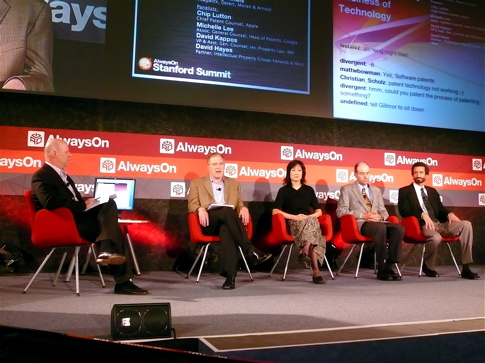AlwaysOn Stanford Summit: lawyers for Google, IBM, and Apple ponder the patent system

If you, like me, have been trying to get your arms around the state of U.S. patent system and the various reforms and changes it is confronting, you hopefully will enjoy my notes from the AlwaysOn Stanford Summit panel on "The Patent Crisis: Crossroads for the Business of Technology." The panel featured patent and intellectual property lawyers from Google, IBM, and Apple, as well as law firms Sedgwick Detert and Fenwick & West. The next episode of this WEEK in LAW will be on current patent issues as well, and you can view our discussion points and/or suggest new ones here. Watch the AlwaysOn Stanford Summit's Webcast and chat (a most excellent hecklebot) here.
According to these folks from Google, IBM, Apple, and two respected IP law firms:
- the patent system needs help,
- it's more important than ever to think about protecting innovations early and often,
- open source and proprietary technologies can and should happily co-exist, and
- changes are in the offing that promise to improve matters for players both large and small in the IT arena.
Here are my notes:
Michael Brandis (Moderator), Chip Lutton, Michelle Lee, David Kappos, and David Hayes.
Chip Lutton, Chief Patent Counsel, Apple: problems with the current patent system include the high volume of patent applications, the inability to guarantee the quality of the patents issued, and the lack of a good system for valuing the patents issued. Sounds like a bubble market. The question for this bubble market (like others) is can we manage a soft landing or will there be some other crisis as a result of this.
Michelle Lee, Assoc. General Counsel, Head of Patents, Google: Thinks we are in a patent crisis. Increasingly there are entities with no other business than to monetize patents (that is, you negotiate a license with them or end up in litigation). Patent reform efforts are underway aimed at balance in the patent system and reducing litigation abuses.
David Kappos, VP and Asst. Gen. Counsel, Intellectual Property Law, IBM: For some industries the current patent system is working well, bio and pharma in particular. But from the standpoint of the information technology industry, where patents are regularly granted that have significant quality problems and there's no regularized market for understanding the validity and value of a patent, it's easy to view the system as broken.
David Hayes, Partner, Intellectual Property Group, Fenwick & West: clients are looking to get patents at a reasonable cost and in a reasonable time. Patent trolls aren't on the radar screen for startups, at their early stage of life. There are backlogs of 3-5 years in getting an application to examination and issuance of a patent.
David Kappos: IBM is the largest patent holder. Question: should the government be more concerned with hiring more patent examiners or dealing with the patent troll problem? David doesn't think hiring more examiners is a fix for all the current patent problems. The patent office also needs to move to a much more adaptive process, leverage technology in the public domain, and reach out to the communities that exist in this area.
Chip Lutton: Most patents that are issued are never litigated; the overwhelming majority are never even licensed. So why would you have a system where you overinvest in the examination process for the 90% of applications that are never disputed. Need to look instead at the patents that are particularly important. [DMH aside: how on earth do you identify this up front?]
Michelle Lee: The patent reform bill now pending in the House and Senate addresses things like where a patent owner can sue a defendant (aimed at stopping forum shopping). Apportionment also part of the bill: if your patent only covers a small piece of a product, your ability to get an injunction and/or damages should be reduced.
David Hayes: Startups need patent counsel early on to keep from inadvertently taking actions that destroy your patent rights. The examination process runs 3-5 years (with some ability to accelerate in limited cases). People aquire patents not just to protect what they have but also to use as others in the event they're attacked. Cannons vs. switchblades: you need comparable tools to have leverage with your competitors.
David Kappos: Something that might be a little bit controversial that he would tell clients is to be cognizant of what others are doing. There is a school of thought that you shouldn't look at others' patents because you can be liable for enhanced damages if you're found to have infringed. Kappos thinks it's better to know what's going on, and he tends to take the defensive yet proactive approach of looking at others' portfolios. IBM does clear its products and services initiatives in advance, and takes advantage of its thousands of cross-licensing deals. You don't want to put a product out then have to face someone with a patent you have no way of answering.
Michelle Lee: When you become successful, all of a sudden, everyone wants a piece of it. Google suffers from this. So, as you're developing the products, you've got to be filing for the patents and monitoring the patent activities of your competitors.
Chip Lutton: Budgetary constraints and bandwidth can lead startups to keep from protecting their original generation of ideas. But they need to do it, or the rights will disappear. Doesn't matter that patent reforms are being considered in Washington. Those changes are aimed at bringing the system back into balance and reining in excessive damages awards. Regardless of the state of the system, companies need to worry about protecting their technology early on.
David Hayes: Answers question from audience about patenting in India, China, etc. If you have limited funds, spend in China first, India second, Europe third.
Michelle Lee: It's worthwhile to file in China despite widespread trepidation about the Chinese justice system because it's a critical economic market and the patent system there is changing rapidly. They're very quickly coming into compliance with European patent standards. If it's a market for your products and services, you need to be filing there.
David Hayes: Open source and open standards are not a threat to patented technologies. To the contrary. When you're making open source investments, you're making them to fuel some other part of the business. You're going to want to ensure that the open source layer remains open and has open standards, and that the community around it is vibrant and can innovate freely. You're also going to want to have intellectual property that protects that proprietary position you're building around it.
Michelle Lee: Question to her, "Is Microsoft a threat to open source?" The CEO and GC of Microsoft have come out saying they have hundreds of patents being infringed by the Linux operating system. So yes. Google is part of an alliance that has agreed not to pursue any patents that may be impacted by Linux.
Chip Lutton: Apple has products that are based on open standards, some that are based on open source, and some that are proprietary. He doesn't think it has to be or should be an either/or.
David Hayes: There are increasingly forms of IP insurance, but the vast majority of his clients don't purchase it. Historically, it has been limited in coverage and very expensive.
Chip Lutton: The cost of patent insurance can be extreme, and it's another symptom of a system out of control.
Last week the Supreme Court required a higher standard of nonobviousness, what's the impact of this? Chip Lutton: When you have two concepts that are already known and someone tries to patent putting them together, that's what the case involved.
Question re patent peer review, what does the panel think? David Kappos: there's a project in the beta phase now, initiated by a number of companies involved in the open source community, together with NY Law School and the USPTO, the Peer to Patent Project. IBM has live patent applications under review there. Thinks it's an example of the patent system coming into the 21st Century.
[Update:] More notes, from Colette Vogele.
